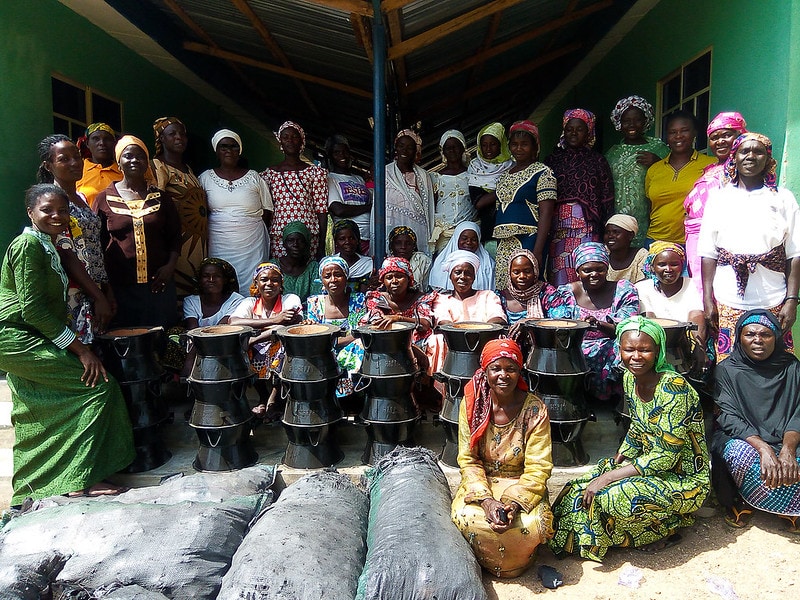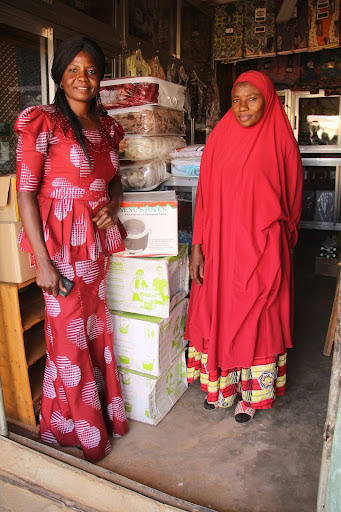Our Power, Our People, Our Planet: A Women-led Clean Energy Movement in Nigeria
People power has always been the heartbeat of change. But today, it’s clearer than ever that we’re at a turning point. Environmental degradation and injustice are no longer distant threats—they’re present, immediate, and reshaping lives in real time. They demand bold, collective action.
This Earth Day, we’re reminded that the most effective solutions are often already in motion—rooted in local knowledge, sustained by community leadership, and driven by care for both people and planet. Across the globe, grassroots women are at the forefront of this transformation: restoring forests, strengthening food systems, generating livelihoods that uplift entire communities—and driving life-saving shifts in how families cook, breathe, and live.
In Nigeria, a woman-led clean energy movement is shifting power—literally and figuratively. Through the Women’s Clean Cookstoves Training Program, a partnership between Women’s Earth Alliance (WEA) and the Women’s Initiative for Sustainable Environment (WISE), women are launching and scaling clean cookstove businesses that reduce harmful emissions, save lives, and build local economies. It’s a model that brings together clean power and people power—and it’s already reaching thousands.

A Model for Change: The Program, the Movement, the Impact
Launched in 2015, the Women’s Clean Cookstoves Training Program was designed to confront one of Nigeria’s most pressing environmental and public health challenges: the widespread use of traditional wood-burning stoves.
Nearly half the world still cooks with firewood, charcoal, or coal over open flames. In Nigeria, this method contributes to indoor air pollution that causes an estimated 2 million premature deaths globally each year—many of them women and children. Firewood smoke is the third-leading cause of death for women and children in Nigeria, after malaria and HIV/AIDS. And for those who collect fuel—often women and girls—the task increases exposure to gender-based violence.
The environmental toll is just as urgent. Traditional cooking practices release nearly 1 gigaton of carbon emissions annually—about 2% of global emissions—and contribute significantly to deforestation, black carbon pollution, and biodiversity loss.
WEA and WISE’s program responds to these intertwined crises with a women-led solution. Participants receive hands-on training in clean energy education, business planning, leadership, and environmental advocacy. Each WEA entrepreneur receives an initial batch of clean cookstoves to sell through her new enterprise. Once sold, she receives more—creating a regenerative cycle of income, energy access, and impact.
To date, over 1,800 women entrepreneurs have distributed more than 60,000 clean cookstoves across Nigeria. Families who once spent $5 to $10 a month on fuel now reinvest that money into food, healthcare, and education. Clean stoves cut indoor air pollution by up to 90%, reduce the need for firewood, and give forests space to recover. And because the program includes access to microloans, lending circles, and grassroots financial tools, women aren’t just participating in the clean energy economy—they’re shaping it.
This is environmental justice in action: clean energy that stays local, profits that stay with women, and solutions that ripple outward from kitchens to communities.
Binta’s Story: How a Single Spark Became a Movement
When Binta Yahaya first joined the Women’s Clean Cookstoves Training Program, she simply wanted to protect her family’s health. She never imagined she would become a powerful model of clean energy entrepreneurship in her region.
Within a week of completing her training, Binta had sold 70 cookstoves to women in her village—replacing polluting open-fire stoves with safer, high-efficiency models. Within a year, that number had grown to over 1,000. Today, she’s sold more than 15,000 clean cookstoves across Sub-Saharan Africa.
Each stove Binta sells reduces household air pollution, lowers fuel costs, and gives a woman back time, safety, and agency. And for Binta, each sale also strengthens her business, expands her leadership, and inspires others to join the movement.
Her story is not an outlier—it’s a reflection of what’s possible when women have access to the resources, community, and support they need to lead. It’s one spark among thousands.

A New Kind of Power: From the Ground Up
This clean energy movement is about more than cookstoves. It’s about women reclaiming power—in their homes, their economies, and the environments they care for every day.
Clean cooking is one of the most effective solutions to environmental harm, yet it remains one of the most underfunded. And for many families, even the most efficient stove is out of reach without support. That’s why WEA and WISE’s model goes beyond distribution. Each WEA entrepreneur gains access to microloans, lending circles, and grassroots financial systems that keep profits—and decision-making power—close to home.
Each stove sold does more than replace an open flame. It sparks opportunity. Women are building businesses. Families are breathing easier. And communities are finding new ways to thrive.
Across Nigeria, environmental solutions are growing from the inside out—rooted in care, connection, and community leadership. These aren’t top-down interventions. They’re conversations around kitchen tables. They’re women supporting women. They’re practical steps that lead to profound change.
This is what it looks like when renewable energy meets people-powered leadership. When women have the tools and resources they need, they don’t just respond to crisis—they shape the future.
And as that future comes into view, we don’t have to look far. It’s already here—in communities like Binta’s, where women are proving that real power grows from the ground up.
